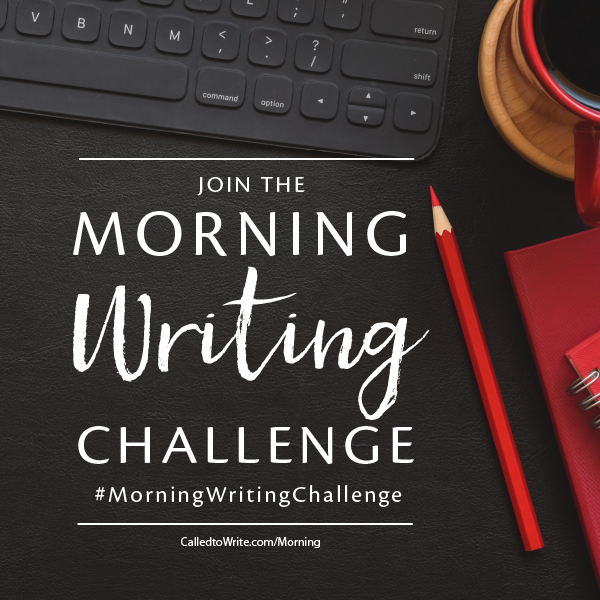Welcome back to the Morning Writing Challenge Tips series.
If you haven’t joined the challenge, it’s (really!) not too late to join us. You can still find benefit in participating for the next two days. Find all the details here.
Either way, these tips are useful for building and sustaining a lasting writing practice.
Morning Writing Challenge Tips #7 & #8
Today I’m sharing two new tips, #7 & #8.
Tip #7: On tougher days, try focusing on “ebb writing.”
When the going gets tough, sometimes we need a back up plan for writing. A way to keep writing, keep moving forward, even when our minds and hearts are not quite in the game.
On days like these, I focus on “ebb writing.” (Hat tip to Naomi Dunford, formerly of IttyBiz, for this idea.)
Ebb writing is about doing the easier writing. On days when I’m distracted, stressed, frustrated, extra resistant, or tired, I might do something like check my script’s scene headings for continuity, run spell or grammar checks, or make simple edits. I made a point yesterday to do heavier lifting on my script revisions (redlining the draft of my current section, which required more focused thinking) so I could make those changes in the draft today. Easy peasy lemon squeezy 🍋, as my niece would say. Then, because my brain got deeper into writing mode, I was able to begin a slightly harder revision of a scene I’d flagged yesterday. I’ll finish it up tomorrow.
As Steven Pressfield says, “It’s not the writing part that’s hard. What’s hard is sitting down to write.” So if I can get myself to my computer, minimizing distractions and other inputs along the way (more on this in Tip #8, below), and start with something easy, I can get off and running. On the other hand, if I don’t find myself rising to the challenge for the day, I can stick with ebb work, and feel good about having moved my writing forward, no matter what, free to begin again anew the next day.
Ebb writing can also look like simply putting your focus on ANY writing for the day. Want to write a poem today? Go for it. Need to vent about the state of the world? Awesome, get it on the page. Write your way through it.
Here are some examples of ebb writing you might consider, in no particular order:
- Doing administrative writing tasks like organizing you writing project files on your computer (this is a great time to figure out which “New Final Final” is the real current draft).
- Running spelling and grammar checks on work you’ve already written (assuming you have a work in progress).
- Formatting chapter/section headings and checking their numbering.
- Checking for continuity with your scenes, like time of day.
- Reviewing your outline or story development work.
- Reading over sections you’ve already written and making notes about what’s working well and what needs revision.
- Writing intuitive dialogue exchanges with your characters to find out what they think.
- Freewriting scenes “outside” your draft (like backstory scenes that won’t make it into the final draft but teach you about your characters or story).
- Making simple edits.
- Writing morning pages.
- Bullet journaling.
- Freewriting about anything.
A bonus tip: Sometimes you just need to START. When I’m feeling particularly resistant, I’ll often tell myself, “you only have to write for five minutes.” Then I’ll set my timer, and open my script files and start reading through where I left off. Next thing I know I’m tweaking a few words and lines and then I’m off writing the next scene in my outline, writing to meet my original goal (usually 50 minutes). Just starting works wonders.
Putting this into practice: Think about what kind of ebb writing you might be able to do on hard days. Just having a mental catalogue of possibilities really helps you be able to think about what you CAN do, instead of what you can’t. :)
Tip #8: Block out the distractions.
On tough days and regular days alike, writers need to find ways to block out distractions. (Sometimes the distractions are good things too!)
Remember today’s quote from Austin Kleon? “The biggest task in the morning is to try to keep my headspace from being invaded by the outside world.”
Here are some my current favorite ways to block distractions and keep your headspace clear:
- Use app and website blockers to keep yourself from getting distracted. (My list of current favorite apps is below.)
- Put your phone in Airplane or Do Not Disturb mode to prevent interruptions and distracting messages from popping up while you’re working. (I’ve set my phone to allow emergency interruptions in DND mode if needed.) If you’re writing first thing in the morning, you might sleep with it in airplane or DND mode and just leave it that way until you’re done with your morning writing time.
- Turn off most (if not all) notifications on your devices. I have a few I leave on, but I periodically go through and turn off app notifications so they don’t steal my attention from my work.
This includes laptops and desktops too. On my Macs I have notifications disabled between 10 p.m. and 9:59 p.m. ⏰ (Yes, you read that right.🙂 I couldn’t find a way to disable them all quickly so I just turned on Do Not Disturb for essentially 24 hours.)
- Remove addictive apps from your devices. Just take ’em right off there. You’ll be surprised how quickly it calms down addictive behavior. Yes, you might miss them. But most of that same content you can access on a computer, and changing up how you access it breaks the addiction cycle. You may find that you can put them back on later, or you may find that you take them off/put them on periodically. In my case, I’ve taken off Facebook, Gmail, and Twitter, though I allow Twitter back on during fire season for up-to-date news. If I start addictively perusing anything though, off it comes.
- Write in writing sprints with a timer running, as I mentioned yesterday, preferably a timer that makes it hard to use your phone, like the Forest app I also told you about. (No one wants to be killing trees!)
- Limit yourself to news reading AFTER your morning writing sprints. If you cannot resist, ONLY allow yourself to read trusted, grounded news sources.
- Stay out of email (and texts if needed) too. Don’t let other people’s desires, demands, and needs hijack your attention. Keep your field of focus as small as you can until you’ve finished writing for the day (another good reason to write first in the day).
- Stay away from social media until after you’re done with your writing (I know I’m steering us to post on social media for this challenge; my method has been to quickly post from my phone, then get to work writing, then come back later to check on other writer’s posts. It’s worked well, so far, with only minor dalliances putting hearts on a few extra Instagram posts this morning 🙂).
Focus Apps & Tools
During the pandemic, I’ve found that I have had to increase my use of distraction blocking tools to help me stay on track. I keep an eye on myself, and if I find myself straying, I ramp up my blocking efforts until I’m on track. ;)
Here’s a list of my current favorite apps and supports to help me focus.
- App blockers like the Focus App (Mac) allow me to block social media websites and other rabbit holes like Quora during scheduled hours. I can also block apps on my computer from running as well, like Tweetdeck. Focus also makes it so I can’t access my email until my scheduled focus time is over (5 a.m. to 10:15 a.m. is my scheduled block ⏰).
- (The Freedom App is an alternative to Focus for PCs and works across multiple devices as well. They seem to have a November special running right now too.)
- Screen blockers like HazeOver (Mac) is another current favorite of mine, which I use to make everything disappear except the current window I’m working in. (Not sure about a PC alternative.
- Full screen mode in writing apps. Most apps we write in have a full screen mode or composition mode to make everything else disappear, as an alternative to something like HazeOver.
- Timers that block phone use. I use both the Forest App and Block & Flow App for my phone, which I know I mentioned yesterday too. These timers stay on the lock screen on my phone, which stops me from picking it up to “check” on things. See also Freedom, above, which apparently has a way to block apps on devices too. I use one exclusively for script work and the other for various other writing projects.
- Group writing sprints with my Called to Write community. The more sprints I attend, the stronger my writing habit and focus, and the less likely I am to get distracted. I know it’s not an app, per se, but it’s a huge anti-distraction tool for me so I’m including it here.
Putting this into practice: See if there’s something in Tip #8 you might use to shore up your writing boundaries and limit distractions. Even picking one thing could be huge!


